
Yes, herbs are also a healthy addition to the normal diet for dogs. But not every herb is suitable for them; some are even poisonous.
To the point
- commonly used barf ingredient
- not every herb is suitable
- only in consultation with a veterinarian
- only in small quantities
Table of contents
- Herbs with B
- D to G
- Herbs for dogs from K to L
- M to P
- Herbs for dogs from R to T
- frequently asked Questions
Herbs with B
basil (Ocimum basilicum)
Due to its anti-microbial effect basil a valuable nutritional supplement for dogs with the exception of pregnant bitches.
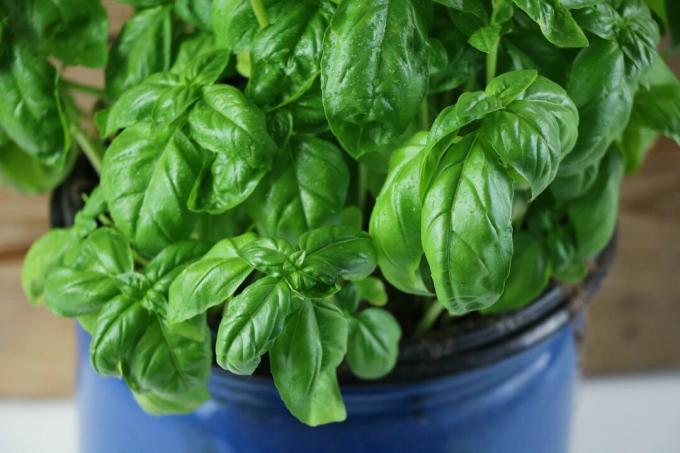
- Ingredients: rich in iron, magnesium, vitamins, good source of protein
- Effect: antibacterial, soothing, good for oral hygiene, digestion and against arthritis
- Application: do not feed daily, fresh or dried
For small breeds it should be no more than one or two leaves, for large breeds up to a teaspoon.
Savory (Satureja)
Also Savory is digestible for dogs and contains a wealth of healing ingredients.

- Ingredients: Bitter substances, tannins, mucilage, vitamin C, essential oils
- Effect: stomach strengthening, antibacterial, anti-inflammatory, appetite stimulating
- Application: fresh or dried with food or as an infusion for drinking
Nettle (Urtica)
It is not only a powerhouse for the garden, but also a plant with many positive properties and effects on the dog's health.

- Ingredients:Nettles lots of vitamin C, lots of protein, minerals, trace elements
- Effect: anti-inflammatory, draining, detoxifying, diuretic
- Application: Dried or fed as a powder, fresh leaves can be rubbed externally as a tea
Applied externally as a tea made from fresh leaves and seeds, it can Nettle Can be used for allergic skin reactions or flea bites.
D to G
dill (Anethum graveolens)
Also dill, also known as cucumber herb, is safe and has many benefits for the health of dogs as long as the right amount is taken to avoid possible side effects.

- Ingredients: essential oils, beta-carotene, vitamin C, B vitamins, calcium, potassium, iron
- Effect: positive effect on the entire digestive system
- Application: in moderation, not daily, fresh or as a powder in the form of teas or tinctures
Dill can promote milk production in lactating dogs. Dill should not be given to pregnant dogs as this would increase the risk of miscarriages.
fennel (Foeniculum vulgare)
fennel As a herb it is particularly suitable for dogs with particularly sensitive stomachs. For them it is the ideal vegetable side dish, but not every dog likes it.

- Ingredients: rich in calcium, sodium, vitamins A and C, essential oils, fiber
- Effect: digestive, anti-inflammatory
- Application: boiled, lightly steamed and pureed, raw or as a tea
Some dogs react to fennel with itching, sneezing, vomiting or diarrhea. In these cases it should not be fed.
daisy (Bellis)
The small flowers of the daisy are a popular snack for many dogs and an all-rounder against one or two niggles.

- Ingredients: Vitamin C, potassium, calcium, iron, magnesium, phytochemicals, inulin
- Effect: blood purifying, anti-inflammatory, digestive, appetite stimulating
- Application: fresh or dried with daily food, also as tea
Greedy (Aegopodium podagraria)
It grows almost everywhere and is usually only used as annoying “weeds” perceived. But the young, fresh leaves of gourd have much more to offer dogs.

- Ingredients: rich in vitamin C and multiple minerals
- Effect: detoxifying, anti-inflammatory
- Application: fresh or dried, also daily and in larger quantities
Herbs for dogs from K to L
chamomile (Matricaria)
Chamomile is very versatile and an all-rounder among medicinal plants, even if the dog sometimes sits a little out of place.

- Ingredients: essential oils, tannins, mucilage, flavonoids, coumarin
- Effect: anti-inflammatory, antibacterial, antiseptic, antipyretic
- Application: internally and externally, as tea or in wet food
Nasturtium (tropaeolum)
With its many positive properties Nasturtium It can be really useful for dogs because it is able to ward off germs.

- Ingredients: rich in vitamin C, minerals, mustard oils, essential oils
- Effect: antibacterial, antiviral, antibiotic
- Application: BARF, internally and externally, fresh or powder, 0.5-1.0 g per day
BARF is the abbreviation for “organically species-appropriate raw food”.
coriander (Coriandrum sativum)
Most people like it dogs but should not be fed to pregnant bitches. The spherical, dried, sweet to slightly burning fruits are used.

- Ingredients: essential oils
- Effect: antibacterial, promotes elimination of toxins, regulates blood sugar levels
- Application: dried, ground fruits also as tea, given lukewarm
lavender (lavandula)
It is best known for its splendor of flowers and distinctive scent. But lavender can't just look pretty.

- Ingredients: essential oil, tannins
- Effect: calming, antispasmodic, stimulating circulation, antibacterial, antirheumatic
- Application: dried flowers internally as a feed additive or tea, externally as oil or tincture
dandelion (Taraxacum)
To most it's just a weed, but dandelion has many positive properties that can also be useful for dogs.
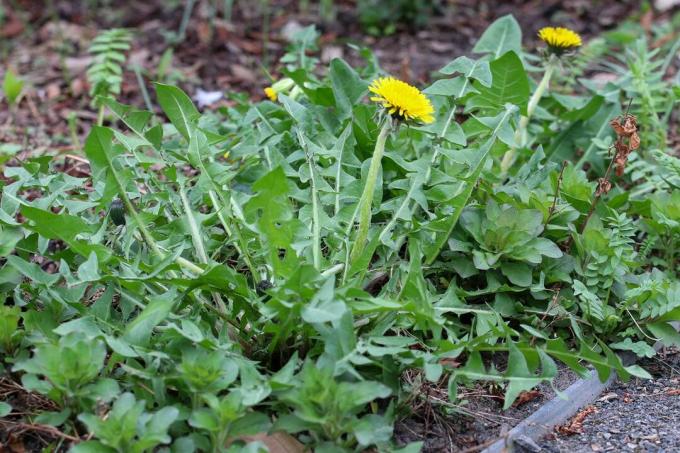
- Ingredients: Bitter substances, vitamins, minerals, flavonoids
- Effect: detoxifying, blood purifying, diuretic, digestive and circulation stimulating
- Application: Leaves, flowers and roots, taken internally as a feed additive, tea or tincture
Dandelion strengthens the organism and can have a rejuvenating effect, especially in older dogs.
M to P
marjoram (Origanum majorana)
marjoram is a very flavorful herb and can benefit dogs in several ways.
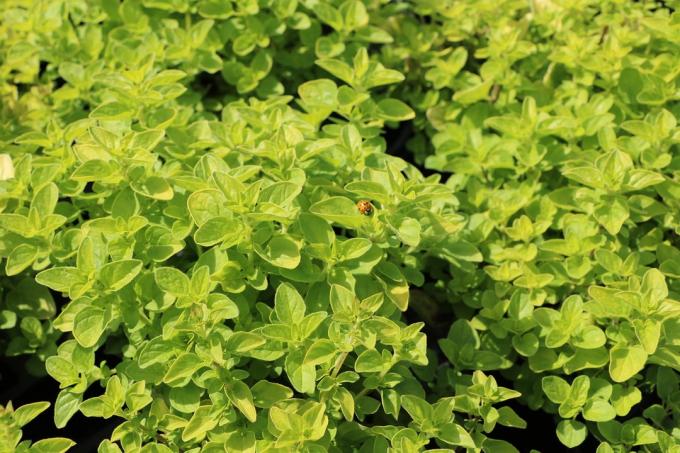
- Ingredients: high proportion of essential oils
- Effect: antibacterial, antispasmodic, promotes a worm-hostile intestinal environment
- Application: Leaves with stem portion, add dried food, apply marjoram oil externally
Meadowsweet herb (Filipendula ulmaria)
This herb was already known and valued in ancient times for its healing properties.

- Ingredients: Salicylic acid, flavonoids, tannins, essential oil
- Effect: pain relieving, anti-inflammatory, antimicrobial
- Application: dried, directly into food, as tea or tincture
This plant is particularly useful for chronic inflammatory diseases such as: b. Osteoarthritis or arthritis helpful.
Melissa (Melissa officinalis)
Characteristic of the Melissa is their fresh, lemon-like scent when the leaves are crushed. It can provide relaxation and well-being for restless dogs.

- Ingredients: essential oils, bitter and tannins
- Effect: calming, antibacterial, virus-inhibiting, pain-relieving
- Application: dried or fresh as a feed additive or tea, externally as oil, herbal sachets
oregano (Origanum vulgare)
Commonly known as pizza seasoning, contains oregano many antioxidants, which are said to have a certain anti-cancer effect.

- Ingredients: numerous vitamins, minerals, essential oils, fiber
- Effect: antibacterial, anti-inflammatory and anti-fungal, nerve-strengthening, antispasmodic
- Application: Add fresh or dried to the food or give it as oil
Parsley (Petroselinum crispum)
It can be a good support for various health problems in dogs, but should under no circumstances be fed to pregnant animals or animals with kidney disease.

- Ingredients: high content of protein, minerals, folic acid and vitamins
- Effect: diuretic, stomachic, deflating
- Application: only small quantities, fresh or dried, for a maximum of two weeks
Herbs for dogs from R to T
rosemary (Salvia rosmarinus)
rosemary is a popular and versatile herb that dogs can also benefit from. It should also not be fed to pregnant animals or animals suffering from epilepsy.
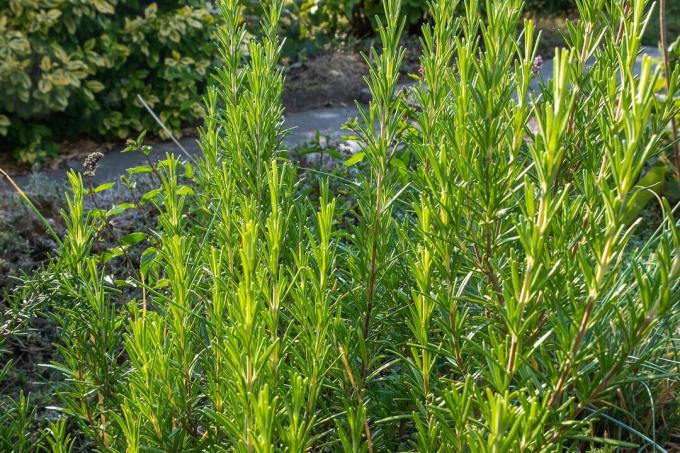
- Ingredients: essential oils, bitter substances, flavonoids, tannins
- Effect: antiviral, promotes blood circulation, balancing, strengthening, vasodilating
- Application:dried leaves, internally and externally, as a tea, poultice, rub
sage (Salvia)
sage can have a positive effect on the dog's organism, but is not suitable for pregnant animals or animals suffering from epilepsy.

- Ingredients: especially essential oils, bitter substances
- Effect: anti-inflammatory, digestive, antibacterial
- Application: flowers and leaves, fresh, cooked, dried or as a tea infusion
The essential oils in sage ensure good breath.
yarrow (Achillea)
It grows in sunny and partially shaded places and can provide dogs with a variety of health problems.
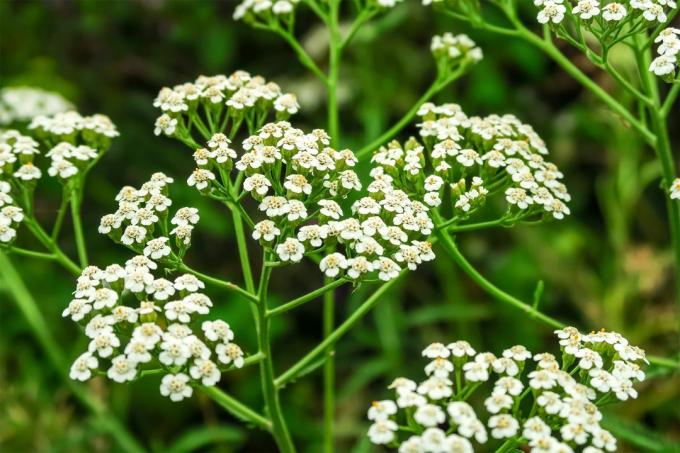
- Ingredients: essential oils, many minerals, bitter substances, flavonoids
- Effect: antibacterial, digestive and liver strengthening, antitumoral
- Application: Flowers and herbs, fresh or dried in food or as a tea infusion
yarrow can easily be confused with the highly poisonous spotted hemlock. You can recognize it and a. by its unpleasant smell of mouse urine and the hollow, red-spotted stems.
Ribwort plantain (Plantago lanceolata)
It grows in every garden and is one of the most important wild herbs for dogs. It can provide quick help for insect bites or small wounds.
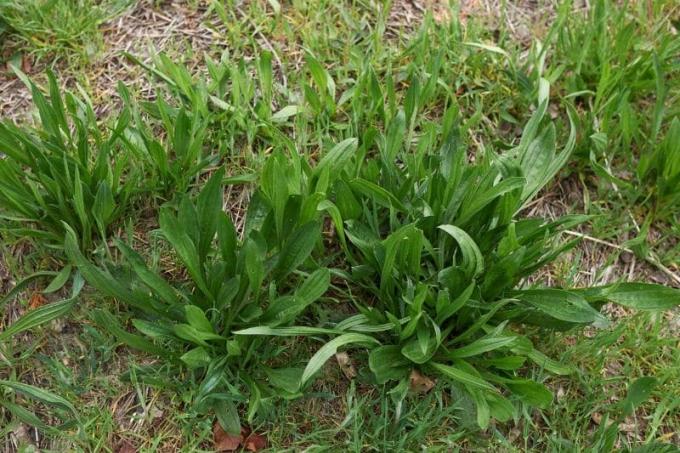
- Ingredients: Mucilage, tannins, flavonoids, silicic acid
- Effect: anti-inflammatory, soothing, germicidal, expectorant, blood purifying
- Application: dried or fresh under the food, crushed as a pad or poultice
thyme (thymus)
Herbs can only ever be used to support dogs. So should thyme u. a. help prevent worm infestation.

- Ingredients: especially essential oils, vitamin C, bitter substances, tannins, flavonoids
- Effect: antibacterial, anti-inflammatory, partly antiviral, against respiratory problems
- Application: Leaves and flowers, fresh or dried as a feed substitute or tea
Because of the essential oils, do not feed it long-term and do not feed pregnant dogs at all.
frequently asked Questions
Are toxic to dogs Woodruff, Wild garlic and chives. However, even with some non-poisonous herbs, caution is advised, especially with sick and pregnant animals, e.g. b. with rosemary and valerian.
Under no circumstances should you buy herbs that have been treated with pesticides or chemicals. They should come from controlled organic farming. Ideally, you use herbs from your own, pesticide-free garden.
Basically, you should only feed them in small quantities, depending on the size of the dog and after consulting a veterinarian. You start with small amounts to test tolerance. The herbs should be chopped or pureed well. Fresh herbs are best, but they also have a good effect when dried.



